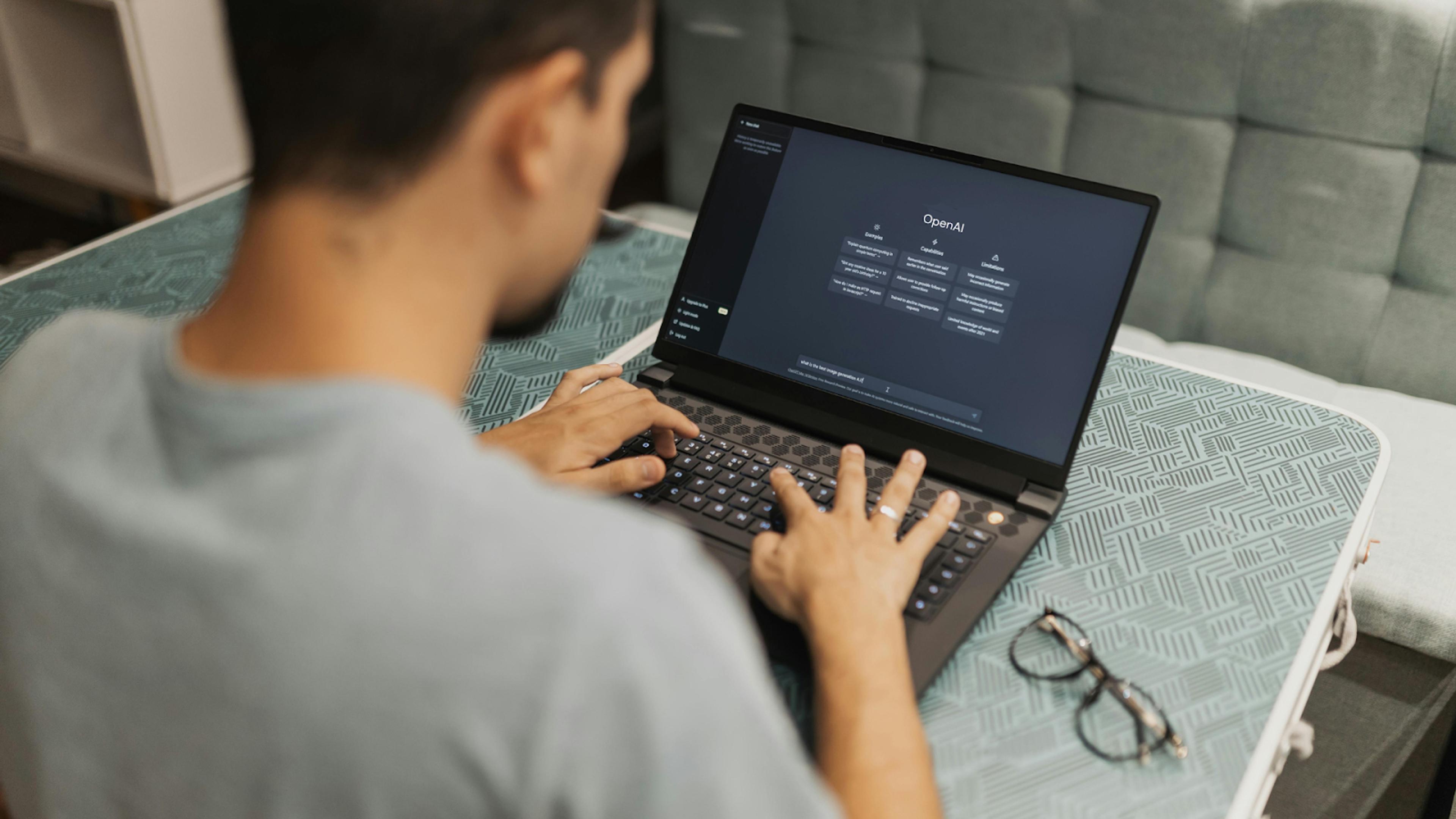How to Land an Internship at OpenAI (2026)
Discover how to land an OpenAI internship in 2026. Get expert tips on applying, standing out, and preparing for interviews to kickstart your AI career.
Posted November 18, 2025

Join a free event
Learn from top coaches and industry experts in live, interactive sessions you can join for free.
Table of Contents
If you’re still sending generic applications to OpenAI or hoping your resume will just land on the right desk, you’re missing out on what really matters. Today’s top interns don’t just apply. They build standout profiles, demonstrate real passion, and strategically position themselves as invaluable assets to OpenAI’s mission. AI internships are competitive and require tailored resumes and cover letters to make a strong impression.
This guide doesn’t just walk you through the steps to apply for an internship at OpenAI. It is designed to show you how to stand out, leverage your strengths, and make your application impossible to ignore. From aligning with OpenAI's mission to crafting the perfect resume and preparing for the interview, we’ll cover everything you need to become a standout applicant. Backed by insider tips and real-world examples, it’s the roadmap you need to land your dream internship at OpenAI in 2026.
Read: Artificial Intelligence Jobs: Salary Overview by Seniority
OpenAI’s Mission and Impact
OpenAI is driven by a clear and ambitious mission: to ensure artificial general intelligence (AGI) benefits all of humanity. The focus isn’t just on technical innovation but also on ensuring AI is safe, reliable, and aligned with human values. By solving some of the world’s most complex challenges in artificial intelligence, the company stands at the forefront of advancing AI that will impact industries across the globe.
Joining this team means working in a collaborative environment where researchers, engineers, and AI experts work together to push the boundaries of what’s possible. Whether you’re developing new algorithms, exploring AI’s societal implications, or optimizing machine learning systems, your contributions will have a global impact and help shape the future of technology.
The Benefits of an OpenAI Internship
Interning at OpenAI offers the chance to work with a wide range of AI tools and technologies, collaborate with experts in the field, and contribute to meaningful research. Here are the aspects of the internship:
- Interns have access to a variety of AI research tools, including machine learning frameworks and natural language processing (NLP) libraries, to support their work in AI development. These resources help interns engage with ongoing research in AI and contribute to real-world applications.
- They foster a collaborative team culture, where interns work closely with researchers, engineers, and other professionals. This environment encourages cross-disciplinary collaboration and provides the opportunity to learn from experts while contributing to AI projects.
- Interns participate in projects that align with the company’s mission to develop AI safely and beneficially. These may include developing new machine learning models, analyzing the ethical implications of AI, or exploring AI’s societal impact. Interns are involved in projects that aim to advance AI technology and apply it to practical challenges.
- Interns are treated as full members of the team at AI organizations like OpenAI. They offer opportunities for personal and professional growth, helping interns build foundational skills for a career in AI. Interns receive mentorship and feedback that can guide their development both within OpenAI and in the broader AI field.
- They provide competitive compensation for interns, recognizing the value of their contributions to research and development efforts.
Types of OpenAI Internships
This offers several internship tracks, each designed to immerse you in the world of AI while developing real-world skills. Here’s a quick look at the available roles:
1. Research Internships
As a research intern, you’ll directly contribute to the advancement of AI through cutting-edge research in machine learning, reinforcement learning, computer vision, and natural language processing (NLP). This role is ideal for individuals with a strong academic background or experience in research and a mindset focused on pushing the boundaries of AI. You’ll have the chance to collaborate with AI researchers to develop novel algorithms, conduct experiments, and contribute to papers that shape the future of AI technology. If you’re passionate about exploring new AI paradigms and contributing to global AI projects, this internship is the perfect fit for you.
2. Engineering Internships
Engineering interns at OpenAI work on developing and optimizing AI systems and software. If you have a background in computer science or software engineering, this internship will offer you the chance to apply your skills to real-world AI applications. You'll work closely with engineers to enhance machine learning frameworks, build infrastructure that supports large-scale data processing, and fine-tune algorithms for efficiency and performance. Interns in this track are expected to have a strong technical mindset and the ability to troubleshoot complex systems.
3. AI Policy and Communications Internships
AI is not just about technology. It is also about responsible development and deployment. As an intern in AI policy or communications, you’ll play a crucial role in shaping the conversation around the ethical and societal impacts of AI. This role involves crafting reports, conducting research on AI policy, and helping communicate OpenAI's mission to the broader public. You’ll be exposed to the intersection of technology and law and learn how to advocate for ethical AI practices that balance innovation with social responsibility. If you’re interested in AI’s potential impact on society and are passionate about shaping AI policies, this internship gives you a front-row seat to the evolving conversation.
4. OpenAI Residencies
For those seeking a deeper, more immersive experience, this residency program offers a long-term opportunity to work on high-impact research and development projects. Residents engage in substantial work across various domains, contributing to AI systems and working alongside experts who will guide you throughout the experience. Residents in the OpenAI Residency program work on real AI problems with research teams while receiving a full salary. This program is ideal for individuals looking to make a long-term commitment to AI development and research, as it often leads to full-time roles at OpenAI. It’s also an excellent fit for people who have a strong desire to contribute and are ready to take on significant responsibilities while gaining access to exclusive resources in the AI space.
Why These Internships Matter
An internship at OpenAI is your chance to take the first step toward a meaningful career in AI. You'll gain hands-on experience, contribute to impactful projects, and work alongside experts who are pushing the boundaries of technology. Whether you're focusing on research, engineering, or AI policy, you'll leave with the skills and insights to set you up for a future in one of the most exciting fields today.
You’ll hear directly from some of the best minds in the field, learning how to translate research into real-world applications and preparing yourself for high-level AI jobs in the future. OpenAI values interns who are not only technically proficient but also driven by a curiosity about how AI can benefit humanity and solve some of the world’s most pressing problems.
If you’re looking for personalized guidance on which type of internship to choose, consider booking a 1:1 coaching session with an AI career expert. Also, get feedback on your resume, interview prep, or strategies to stand out as a top applicant.
How to Apply for an OpenAI Internship
1. Understand the Requirements
To apply, you need to meet OpenAI’s eligibility criteria. Typically, internships are open to students, recent graduates, and early-career professionals passionate about AI and equipped with a solid academic background in fields like computer science, engineering, physics, neuroscience, or biology. Relevant experience in AI, machine learning, or research is highly valued. Candidates must also be pursuing an undergraduate or master's degree in a relevant field and have at least one additional semester of schooling remaining after the internship.
2. Tailor Your Resume and Cover Letter
Your resume should highlight relevant experience, such as AI research projects, coding skills, or contributions to open-source initiatives. Be sure to showcase your hands-on experience.
In your cover letter, explain why OpenAI’s mission excites you, how your skills align with their values, and what unique contributions you bring to the team. Tailoring both documents is important to standing out from the competition.
3. Submit Your Application
Once you’ve tailored your resume and cover letter, visit OpenAI’s careers page to submit your application. Make sure to upload all the necessary documents, including your cover letter, and any supporting materials (like GitHub links or a portfolio). Be mindful of application deadlines, which typically align with summer internship cycles.
Read: An Expert’s Guide to Resumes: Five Tips to Make You Stand Out
The OpenAI Internship Interview Process
1. Initial Screening
After submitting your application, the recruitment team will review it. If you’re shortlisted, you’ll be invited for an initial screening. This is a chance to discuss your background, why you want to work at OpenAI, and what you hope to contribute. You’ll also have the opportunity to ask questions about the internship and OpenAI’s culture. The interview process at OpenAI can take anywhere from 2 to 6 weeks and involves several rounds, including technical and team interviews.
2. Technical Interview
For technical internship roles (research or engineering), you’ll undergo one or more technical interviews. These will assess your knowledge of algorithms, coding, and problem-solving abilities. Be prepared to solve coding challenges and discuss past projects.
3. Behavioral Interview
OpenAI values team collaboration and curiosity. During the behavioral interview, expect questions that explore your teamwork style, problem-solving approach, and interest in OpenAI’s mission. They want to know how you think, how you approach challenges, and how well you’ll integrate with their team culture.
4. Final Interview and Offer
If you succeed in both the technical and behavioral interviews, you’ll be invited for a final round. This interview is typically more in-depth, focusing on your alignment with OpenAI’s mission and your long-term career goals. Successful candidates will receive an internship offer.
How to Stand Out as an Applicant
1. Build a Strong Portfolio
OpenAI is looking for candidates who not only have academic knowledge but also real-world experience. Your portfolio should showcase a range of AI projects, whether through open-source contributions, personal projects, or research papers. Projects that highlight practical application, like developing machine learning models, working with natural language processing (NLP), or building AI tools, are particularly valuable.
Example: Let’s say you worked on a personal project to build an NLP model that can summarize news articles. You could upload the code to GitHub, write a clear README documenting your approach, and explain how your model uses advanced algorithms to generate more accurate summaries than traditional models. OpenAI would look at this and see both your technical skill and your ability to contribute to AI's growth.
Expert Tip: Don’t just focus on the technical side. Show how your work solves real problems or pushes the boundaries of what AI can do. If you’ve contributed to a project that’s gained attention, be sure to showcase it. Whether it’s through GitHub or a personal website, make sure your portfolio is easy to access and well-documented.
2. Show Your Passion for AI
OpenAI is deeply committed to advancing AI in a way that benefits humanity. That’s why they value applicants who are genuinely passionate about artificial intelligence and its potential to create a positive impact. To stand out, it’s not enough to simply say you’re interested in AI; you need to demonstrate that passion through your actions.
Example: One candidate might write about how they’ve been working on a project to improve AI-driven diagnostics for healthcare and how that aligns with OpenAI’s mission to develop AI that can solve global problems. This is a reflection of their drive to make an impact. Another example might be attending and presenting at AI conferences, where you discuss how AI can be used to solve ethical dilemmas in emerging technologies.
Expert Tip: Talk about how AI excites you. Share your thoughts on the future of AI and why OpenAI’s mission to develop safe and reliable AI aligns with your values. Be sure to convey your enthusiasm in both your resume and interviews. Show that you're not just looking for a job, but for a purpose-driven opportunity.
3. Network with the AI Community
Networking is one of the most powerful ways to stand out as an applicant. Engage with the AI community online and offline, participate in forums like Reddit’s AI threads, join LinkedIn groups, or contribute to GitHub projects. Attending AI conferences and collaborating on open-source projects can also help you connect with professionals who provide valuable insights and mentorship.
Example: A candidate active on Kaggle, participating in data science competitions, and collaborating on AI projects demonstrates a commitment to learning. Networking with current or former OpenAI interns can also provide firsthand tips to help you prepare for the application process.
Expert Tip: Engaging with the community makes you more visible and positions you as a committed, passionate applicant.
Read: AI Upskilling: Why It's Necessary & How to Get Started
Sample Step-by-Step Guide to Prepare for the Internship
Months 1-2:
- Research the available internship tracks at OpenAI and choose the best fit for you.
- Begin working on AI-related projects and contribute to open-source initiatives.
- Start building a portfolio (GitHub, research papers, etc.).
- Begin networking with AI professionals on LinkedIn, forums, and at conferences.
Months 3-4:
- Deepen your understanding of the technical skills required for your chosen internship track (e.g., machine learning algorithms, Python, etc.).
- Continue enhancing your portfolio with practical projects.
- Tailor your resume and cover letter for OpenAI.
Months 5-6:
- Finalize your application and submit it before the deadline.
- Prepare for interviews by practicing coding problems and reviewing AI concepts.
- Continue networking and stay updated on OpenAI’s latest research and projects.
What Happens After Your Internship?
Securing the internship is a pivotal step toward a fulfilling career in artificial intelligence. But the journey doesn’t end once your internship wraps up. Here’s how it can shape your career moving forward:
1. Conversion to a Full-Time Role
If you demonstrate strong performance during your internship, there’s a good chance you’ll be considered for a full-time position. Many interns are offered permanent roles, but this depends on your performance, the company's evolving needs, and how well you integrate with OpenAI’s mission and culture.
To maximize your chances:
- Show growth, technical excellence, and the ability to contribute to impactful AI projects. If you consistently deliver high-quality work, you’ll stand out as a top contender for a full-time role.
- OpenAI thrives in a collaborative, mission-driven environment. Demonstrate teamwork, curiosity, and a passion for AI’s potential to benefit humanity. These qualities are central to OpenAI’s culture.
- Adaptability is crucial. Those who can adapt to new challenges and take on increasing responsibilities will be highly valued. Show that you're eager to grow with the company and take on more complex roles.
Note: Even if a full-time offer doesn’t come immediately, your internship at OpenAI will still provide immense value. You'll gain insights, build a strong professional network, and position yourself for opportunities either within or outside the company.
2. Long-Term Career Growth
Whether or not you transition into a full-time role at OpenAI, your internship lays a foundation for lasting career growth in AI. Here’s how it can propel you forward:
- During your time at OpenAI, you’ll be exposed to cutting-edge AI tools, high-impact research, and real-world AI challenges. The technical skills you develop are highly transferable across a wide range of AI careers, whether in AI engineering, research, or policy.
- OpenAI is home to some of the brightest minds in AI. The relationships you build with mentors, colleagues, and industry experts will be crucial as you advance in your career. These connections can open doors to opportunities in AI companies, startups, or even academia.
- Interning here is a badge of credibility in the AI field. OpenAI’s leadership in AI research and development will significantly boost your professional standing. It signals that you’ve worked at the forefront of AI innovation, solving complex problems with a team of experts who share your passion for impactful AI.
- Other top-tier companies in this field will highly recognize your experience. You’ll walk away with a proven track record, marketable skills, and a strong foundation that positions you for roles like data scientist, machine learning engineer, or AI policy advisor.
- One of the most valuable takeaways from your internship will be how to continue learning in a rapidly advancing field. You’ll not only gain hands-on experience with AI tools but also learn how to stay updated on the latest research and technological advancements.
The Bottom Line
You don’t need to have everything figured out to start, but you do need to start. Every successful OpenAI intern began with uncertainty, gaps in knowledge, and projects that didn’t go as planned. What matters most is your commitment to keep moving forward. The journey to a career in artificial intelligence isn’t about perfection from day one. It's about building a foundation, learning continuously, and applying what you’ve learned to real-world projects.
Start by building something that lets you put your skills to work. Share your progress, reflect on what worked (and what didn’t), and then try again. This iterative process of learning, building, and improving is how the best in AI are made.
The best applicants aren’t those who know everything right away. They’re the ones who kept pushing, kept iterating, and stayed curious even when it got tough. So, if you're ready to take the next step in your AI career, apply for an internship at OpenAI and begin shaping your future today. And remember, if you ever feel lost or unsure of your next move, working with a mentor can help guide your path, refine your resume, and prepare you for interviews.
Your future in AI starts now. Keep building, keep learning, and don’t be afraid to fail because that’s where the real growth happens.
Ready to Contribute to the Future of Artificial Intelligence?
If you're ready to take the next step in your AI career, consider reaching out to someone who's been there. Book a one-on-one session with an AI career coach and get personalized guidance to help you land your dream internship. Whether it's refining your resume, prepping for interviews, or figuring out your next move, a mentor can help you avoid mistakes and accelerate your growth.
Also, check out free events and bootcamps designed to improve your skills and keep you ahead of the curve in the fast-paced world of AI.
Your future in the field starts now. Let’s make it happen together!
Deepen your knowledge and read these next:
- How to Become an AI Specialist
- How to Use AI to Automate Tasks & Be More Productive
- How to Build an AI Agent From Scratch: The Beginner's Guide
- How to Future-Proof Your Career in The Age of AI
- Top 20 Careers in AI & Machine Learning (2026)
- Top 10 AI Certification Programs (2025)
FAQs
Does OpenAI offer internships?
- Yes. OpenAI lists internships and early-career roles for students & recent graduates in their Emerging Talent programs.
How much does OpenAI pay interns?
- According to publicly submitted data, interns at OpenAI average around $50K/year (roughly $60/hr in some listings).
Is it hard to get an internship at OpenAI?
- Yes, it’s highly competitive. The company emphasizes strong technical skills, relevant experience, and alignment with its mission.
Why did Elon Musk quit OpenAI?
- Elon Musk left OpenAI’s board in 2018 due to a potential conflict of interest with his work at Tesla and disagreements over the organization’s structure and direction.
Browse hundreds of expert coaches
Leland coaches have helped thousands of people achieve their goals. A dedicated mentor can make all the difference.




















